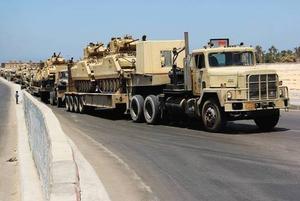TerrorismDeteriorating Sinai Peninsula security situation poses problems for Israel, Egypt
The attacks on Islamist targets in northern Sinai — by Israel on Friday and by Egypt on Saturday — are but the latest evidence of a growing problem of militancy and terrorism in the Sinai Peninsula, a vast, hard-to-control, lightly populated area consisting of steep mountain ranges and a forbidding desert. The growing al Qaeda presence in the area, the continuing influence of Iranian arms smuggling networks, and the influx of foreign Jihadists make the deteriorating security situation in the peninsula a threat both to Israel and to Egypt. The stipulations of the 1982 Egypt-Israel peace treaty complicate to fight against the militants.

Egyptian armor enroute to the northern Sinai // Source: news.cn
On Friday morning, following a warning from the Egyptian military and in coordination with it, an Israel Air Force (IAF) drone fired missiles which destroyed ready-to-launch rockets placed by Islamic militants in an area south of the city of Rafah in north Sinai, The attack also killed five of the militants.
On Saturday, the Egyptian air force picked up where the IAF left off, continuing air and ground attacks on militants who threaten not only Israel, but the Egyptian military itself.
The attacks on Friday and Saturday are but the latest evidence of a growing problem of militancy and terrorism in the Sinai Peninsula, a vast, hard-to-control, lightly populated area consisting of steep mountain ranges and a forbidding desert.
Most of the inhabitants of the Sinai Peninsula are Bedouins, many of them nomads. In the north, in cities such as Rafah and El Arish, many of the inhabitants are Egyptians and Palestinians.
The Bedouins have always had an uneasy relationship with the central Egyptian government in Cairo. The 1982 peace treaty between Israel and Egypt limited the size and quality of the military forces Egypt was allowed to keep in the Sinai, a fact which allowed the Bedouins relative freedom from what they have always considered an oppressive Egyptian presence.
That relative freedom, however, became an increasingly more serious security problem after June 2007, when Hamas, in a bloody coup, seized control of the Gaza Strip from the Palestinian Authority. Hamas headquarters was then located in Damascus, and Syria’s ally, Iran, was quick to begin and send arms to the anti-Israel organization.
Iranian ships would carry large quantities of sophisticated arms to Iran-run arm depots in Somalia. From Somalia, the arms would be carried on small boats – often, by Somalis who, between deliveries, would engage in high-seas piracy – to the southern tip of the Sinai Peninsula. The arms would be unloaded on deserted beaches, where they would be picked up by Bedouins who carried them north to the Hamas in the Gaza Strip.
The growing cooperation with Hamas, and, more generally, the wave of Islamism in the Arab world following to greater freedoms allowed by the Arab Spring, have also caused a growing Islamist presence in Sinai.
The fall of the Mubarak regime in February 2011 exacerbated the situation in the Sinai, as the Egyptian military was becoming more and more involved in domestic political affairs.
